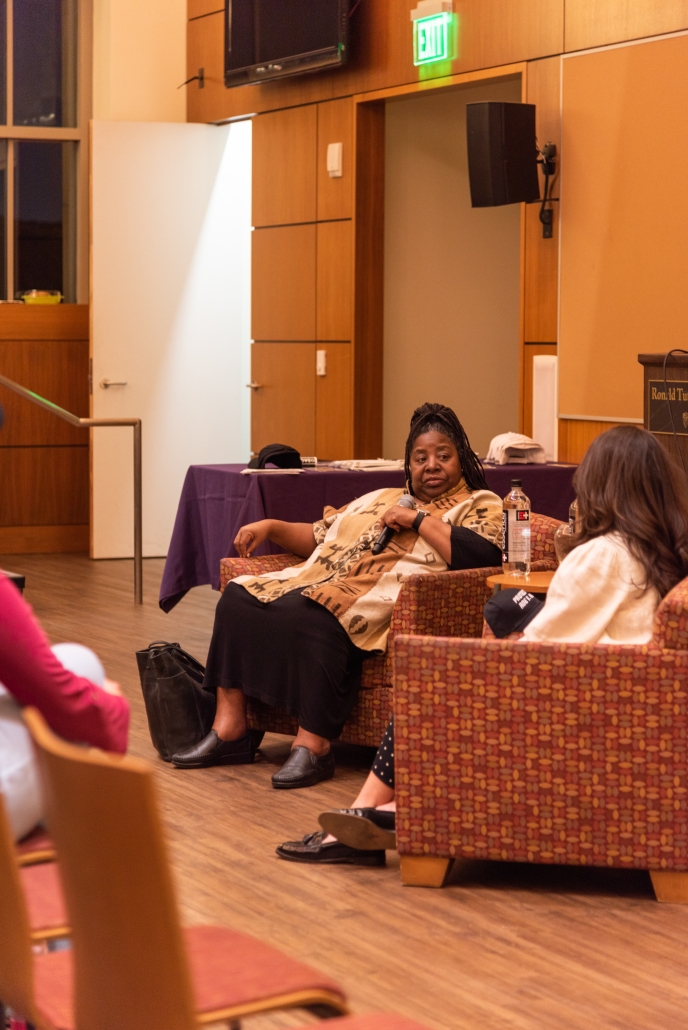Activist emphasizes need for reproductive justice

Feminist and reproductive rights advocate Loretta Ross remembers what it was like to navigate an unplanned pregnancy following sexual assault. She remembers dealing with a number of social barriers. After enduring multiple instances of sexual assault, Ross decided it was time to advocate for reproductive justice she told a crowd of more than 40 students at an event hosted at Ronald Tutor Campus Center Wednesday as a part of the Student Assembly for Gender Empowerment’s project on gender equality, a part of their annual Roe v. Wade activism project to promote on campus the importance of protecting the court decision.
“Every time I thought I was just going to live my life, something reproductive got in the way,” Ross said. “After enough of those incidents, I decided to focus on reproductive politics.”
Co-sponsored by the Undergraduate Student Government, Black Student Assembly and Political Student Assembly, the event was moderated by professor of political science Christian Phillips.
Ross’ first activism project was at the DC Rape Crisis Center, where she faced conflicts from white feminists who were against the all-Black women’s clinic and from Black nationalists who believed the center should focus on fighting racism rather than injustices within their own community.
“We used to get attacked not only by white feminists who didn’t think were feminist enough,” Ross said. “But by the Black nationalist movement who thought that we were betraying the movement by talking about violence of the Black community, that we were selling out to white feminists.”
Ross is the co-founder of the SisterSong Women of Color Reproductive Justice Collective, an organization founded by a group of Black women that addresses the needs and rights of marginalized women. Ross is also one of the creators of the term “reproductive justice,” which combines reproductive rights and social justice. She said SisterSong has the power to promote social trends through modern sayings such as ‘rape culture’ and ‘reproductive justice’ that bring attention to women’s rights, especially to women of color.
“By naming these things, we see power from people who were denied their existence,” Ross said. “The power of naming is the power of defining what is real, what are facts, what is reality.”
Ross said SisterSong has helped expand awareness of reproductive justice and has helped individuals maintain the knowledge that they own their bodies.
“One of the things that I’m impressed about is how people don’t take for granted that their bodies that their bodies are theirs to control,” Ross said.
In addition to an increased awareness about reproductive issues, Ross said there have also been impressive, structural changes to women’s rights, especially in regard to employment from 50 years ago.
“Job ads used to actually say ‘no women,’” Ross said. “If you’re a single woman, there were times you couldn’t get credit, unless you brought a man to sign the paper for you.”
Even though there have been improvements to reproductive justice, Ross said there still needs to be a more accessible and better framework for people to choose abortion.
“[The framework] is inadequate and incomplete, because even if the government doesn’t tell you whether or not to have a baby, you still need social support,” Ross said.
Ross also talked about the group difficulties that SisterSong used to face in regard to accommodating each member’s different cultural origins and habits into the organization’s ideas
“There’s different cultures represented, different ways of expression, different ways of being in a room,” Ross said. “We also learned within SisterSong that it was wrong and usually non-productive to rush a decision.”
Krishan Patel, a sophomore majoring in communication and political science, said he attended the event because he is a pro-choice feminist.
“The focus on reproductive rights is not only a political one but personal,” Patel said. “I admire [Ross’] experience in organizing for progressive causes including reproductive rights for her lifetime.”

